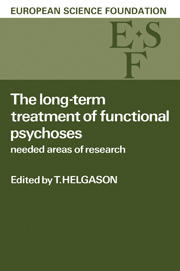Book contents
- Frontmatter
- Contents
- List of Participants
- Introduction
- I Organisational Aspects of Long-term Treatment
- Classification of functional psychoses requiring long-term treatment
- Structural changes in psychiatric hospitals
- Alternatives to hospitals: a field of promises and of not-yet answered questions
- The closing ofmental hospitals in Italy and its impact on long-term treatment of functional psychoses
- Future developments in Italy
- Optimal duration of long-term treatment in functional psychoses
- II Patients Aspects of Long-term Treatment
- III Public Health Aspectsof Long-term Treatment
- Index
Classification of functional psychoses requiring long-term treatment
from I - Organisational Aspects of Long-term Treatment
- Frontmatter
- Contents
- List of Participants
- Introduction
- I Organisational Aspects of Long-term Treatment
- Classification of functional psychoses requiring long-term treatment
- Structural changes in psychiatric hospitals
- Alternatives to hospitals: a field of promises and of not-yet answered questions
- The closing ofmental hospitals in Italy and its impact on long-term treatment of functional psychoses
- Future developments in Italy
- Optimal duration of long-term treatment in functional psychoses
- II Patients Aspects of Long-term Treatment
- III Public Health Aspectsof Long-term Treatment
- Index
Summary
At first glance it might not seem necessary to provide a special classification of the functional psychoses under study. Such psychoses will have their natural place in current psychiatric classifications, primarily the World Health Organization's (WHO) International Classification of Diseases. Such classifications do not, however, pay special attention to the criteria relating to the need for long-term treatment. It is also obvious that current classifications were originally constructed to serve as the basis for statistics, especially for annual reports of psychiatric institutions. Their focus is therefore mainly on such psychiatric disorders which lead to admission to hospital. In the present study, we are interested not only in cases such as these, but equally in psychotic patients who are treated on an outpatient basis or even are not treated at all. Especially among the latter groups there are disorders which are not easily placed within the official classifications. So for our purpose it may be desirable to make some additions to, and modifications of, official classifications.
The organizers of this workshop have selected for discussion the treatment of functional psychoses. They were right to do so since the psychoses are the most incapacitating of all mental disorders. A psychosis changes the identity of the patient's personality, and it is the most urgent responsibility of the psychiatrist to restore the original personality. In addition, choice and maintenance of the right therapy is more important for psychotics than for any other group of the mentally ill. In many cases treatment of psychoses is successful despite the limited facilities and manpower available. It may therefore be regarded as good economy to invest existing resources mainly in the treatment of psychoses (including preventive measures during non-psychotic stages).
Among the psychoses, those which can be called ‘functional’ are a special subject of discussion. Although it is quite difficult to define strictly what should be meant by the term, everybody knows, by and large, what is involved. ‘Functional’ is mostly used in contrast to ‘organic’ and could therefore logically be substituted by the term ‘non-organic'. This seems, however, too daring since it is quite possible that some of the 'functional’ psychoses also have an organic basis which is at present unknown, or only vaguely mooted. Among psychoses there are some with known aetiology, some without. Among the latter, the functional psychoses represent the great majority.
- Type
- Chapter
- Information
- The Long-Term Treatment of Functional PsychosesNeeded Areas of Research, pp. 9 - 14Publisher: Cambridge University PressPrint publication year: 1985

